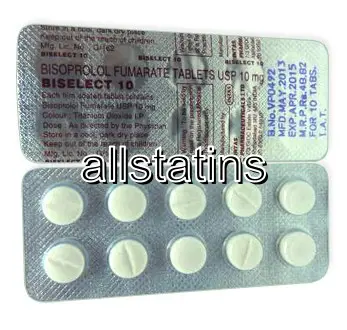| Package | Dosage | Price | Price per Dose | |
|---|---|---|---|---|
| Dosage: 5mg | ||||
| 360 pill | 5mg | AUD531.36 | AUD1.47 | |
| 180 pill | 5mg | AUD292.37 | AUD1.63 | |
| 120 pill | 5mg | AUD216.09 | AUD1.81 | |
| 90 pill | 5mg | AUD177.95 | AUD1.98 | |
| 60 pill | 5mg | AUD132.19 | AUD2.21 | |
| 30 pill | 5mg | AUD78.79 | AUD2.64 | |
| Dosage: 10mg | ||||
| 180 pill | 10mg | AUD261.86 | AUD1.45 | |
| 120 pill | 10mg | AUD193.21 | AUD1.60 | |
| 90 pill | 10mg | AUD155.07 | AUD1.73 | |
| 60 pill | 10mg | AUD116.93 | AUD1.93 | |
| 30 pill | 10mg | AUD68.62 | AUD2.26 | |

Bisoprolol Description
Introduction to Bisoprolol
Bisoprolol is a medication commonly used to manage cardiovascular conditions, particularly hypertension and angina. It belongs to a class of drugs known as beta-blockers, which work by blocking the effects of adrenaline on the heart and blood vessels. This action helps reduce heart rate, decrease blood pressure, and ease the heart's workload. Bisoprolol is often prescribed as part of a comprehensive treatment plan to improve cardiovascular health and prevent complications such as heart attacks or strokes.
How Bisoprolol Works
The primary mechanism of bisoprolol involves selective beta-1 adrenergic receptor blockade. By targeting these receptors mostly found in the heart, bisoprolol effectively lowers the force and rate of heart contractions. This reduction in cardiac workload leads to a decrease in oxygen demand by the heart muscle, providing relief from angina symptoms. Its selectivity also means that bisoprolol has fewer respiratory side effects compared to non-selective beta-blockers, making it safer for patients with respiratory issues such as asthma.
Uses and Benefits
Bisoprolol is widely used to treat high blood pressure, a condition that, if left uncontrolled, can lead to severe health problems. Controlling blood pressure helps prevent strokes, kidney damage, and other cardiovascular events. It is also used in managing chronic angina, reducing episodes of chest pain and improving quality of life. In some cases, bisoprolol is prescribed after a heart attack to prevent further cardiac events. Patients benefiting from bisoprolol often experience improved heart function and stability of their cardiovascular condition.
Possible Side Effects
Like all medications, bisoprolol may cause side effects. Common adverse reactions include fatigue, dizziness, and cold hands or feet. Some patients might experience gastrointestinal discomfort, such as nausea or diarrhea. Because bisoprolol reduces heart rate, excessive lowering can cause symptoms like fainting or a feeling of weakness. Less commonly, allergic reactions may occur, including skin rashes or swelling. It is important to monitor how the body responds to the medication and discuss any unusual symptoms with a healthcare provider.
Precautions and Interactions
Before starting bisoprolol, it is essential to inform your doctor of any existing health conditions, especially respiratory diseases, diabetes, or severe heart failure. Patients with a history of allergies or tolerance issues should be cautious. Bisoprolol can interact with other medications such as other antihypertensives, certain antidepressants, or medications for respiratory conditions. Combining these drugs without medical guidance can lead to adverse effects, including dangerously low blood pressure or heart rate. Regular monitoring by a healthcare professional helps ensure safe and effective use.
Dosage and Administration
Bisoprolol is typically prescribed in a daily dose that varies depending on the individual's condition and response to treatment. It is usually taken once a day with water, with or without food. Doctors often start with a low dose to assess tolerance and gradually increase if necessary. Adherence to the prescribed schedule is vital for optimal results. Suddenly stopping bisoprolol can lead to rebound hypertension or angina, so it is essential to follow medical advice when altering the dose or discontinuing the medication.
